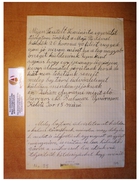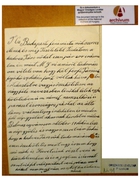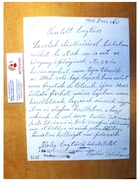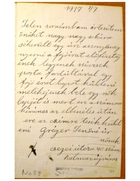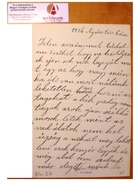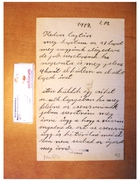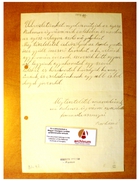Browse Person - 13 results
Sort
m g nc (Mrs. Gábor Magyar) to A Nő és a Társadalom szerkesztősége, Balmazújváros, 26 March 1919
written by Gábor Magyar, fl. 1910 (Magyar Nemzeti Levéltár Országos Levéltára [National Archives of Hungary – National Archives], P999 Feministák Egyesülete [Feminist Association], Box 3 Folder 5) (26 March 1919) , 2 page(s)
TITLE: m g nc (Mrs. Gábor Magyar) to A Nő és a Társadalom szerkesztősége [Editorial Board of Woman and Society], Balmazújváros, 26 March 1919. DESCRIPTION: This card belongs to a group of letters, which gives information on a group of politically active peasant women from Balmazújváros, today North-Easte...
Sample
written by Gábor Magyar, fl. 1910 (Magyar Nemzeti Levéltár Országos Levéltára [National Archives of Hungary – National Archives], P999 Feministák Egyesülete [Feminist Association], Box 3 Folder 5) (26 March 1919) , 2 page(s)
Description
TITLE: m g nc (Mrs. Gábor Magyar) to A Nő és a Társadalom szerkesztősége [Editorial Board of Woman and Society], Balmazújváros, 26 March 1919. DESCRIPTION: This card belongs to a group of letters, which gives information on a group of politically active peasant women from Balmazújváros, today North-Eastern Hungary, and the relationship between them and the Feminist Association (Feministák Egyesülete). See also, Péter Veres, “A femi...
TITLE: m g nc (Mrs. Gábor Magyar) to A Nő és a Társadalom szerkesztősége [Editorial Board of Woman and Society], Balmazújváros, 26 March 1919. DESCRIPTION: This card belongs to a group of letters, which gives information on a group of politically active peasant women from Balmazújváros, today North-Eastern Hungary, and the relationship between them and the Feminist Association (Feministák Egyesülete). See also, Péter Veres, “A feministák [The Feminists],” in Falusi krónika [Village Chronicle], 2nd ed. (Budapest: Magyar Élet kiadása, 1944), 231–243 (14pp.); as well as the correspondence with Ferencz (Ferenc) Pokrócz (Pokróc), Mrs. Gábor Magyar, Mrs. István Bordás, Mrs. István Szabó, Rosika Schwimmer, and the Feministák Egyesülete [Feminist Association]. The letter discusses the following issues: whether women’s suffrage will really become a reality; the activities of the women of Balmazújváros with regard to a petition to the King, referring also to the role of the local authorities, and, most likely in connection with the petition, the difficulties of the local population to sustain itself; the speech that will be given by the (moderate agrarian-socialist social democratic politician) Vilmos Mezőfi. KEYWORDS: Women and Institutions of Empire; World War I; Emperor of Austria, King of Hungary Francis Joseph; Social Reform and Political Activism; Political and Human Rights; Suffrage; Work and Class Identity; Gender and Class; Peasant Women of Balmazújváros; Habsburg Empire; Hungary.
Show more
Show less
Collection
Women and Social Movements, Modern Empires Since 1820
Date Written / Recorded
26 March 1919, 1919
Field of Study
Women and Social Movements
Content Type
Letter
Author / Creator
Gábor Magyar, fl. 1910
Person Discussed
Franz Joseph I, Emperor of Austria, 1830-1916
Topic / Theme
World War I, 1914-1918, Women, Colonization, Empire, and Post Coloniality, Social Reform and Political Activism, Political and Human Rights, Empire and Feminism, Political Parties and Other Male Dominated Organizations, Suffrage, Equal Rights for Women, Social and Cultural Rights, Hungarians, 20th Century in World History (1914--2000)
×
m g né (Mrs. Gábor Magyar) to Szerkesztöségi Hivatalra Feministák Egyesülete, Balmazújváros, ca. 1910s
written by Gábor Magyar, fl. 1910 (Magyar Nemzeti Levéltár Országos Levéltára [National Archives of Hungary – National Archives], P999 Feministák Egyesülete [Feminist Association], Box 3 Folder 5) (1910) , 2 page(s)
TITLE: m g né (Mrs. Gábor Magyar) to Szerkesztöségi Hivatalra Feministák Egyesülete [Editorial Bureau, Feminist Association (in Hungary)], Balmazújváros, ca. 1910s. DESCRIPTION: This postcard belongs to a group of letters, which gives information on a group of politically active peasant women from Balmazú...
Sample
written by Gábor Magyar, fl. 1910 (Magyar Nemzeti Levéltár Országos Levéltára [National Archives of Hungary – National Archives], P999 Feministák Egyesülete [Feminist Association], Box 3 Folder 5) (1910) , 2 page(s)
Description
TITLE: m g né (Mrs. Gábor Magyar) to Szerkesztöségi Hivatalra Feministák Egyesülete [Editorial Bureau, Feminist Association (in Hungary)], Balmazújváros, ca. 1910s. DESCRIPTION: This postcard belongs to a group of letters, which gives information on a group of politically active peasant women from Balmazújváros, today North-Eastern Hungary, and the relationship between them and the Feminist Association (Feministák Egyesülete), and Ró...
TITLE: m g né (Mrs. Gábor Magyar) to Szerkesztöségi Hivatalra Feministák Egyesülete [Editorial Bureau, Feminist Association (in Hungary)], Balmazújváros, ca. 1910s. DESCRIPTION: This postcard belongs to a group of letters, which gives information on a group of politically active peasant women from Balmazújváros, today North-Eastern Hungary, and the relationship between them and the Feminist Association (Feministák Egyesülete), and Róza Schwimmer in particular. See also, Péter Veres, “A feministák [The Feminists],” in Falusi krónika [Village Chronicle], 2nd ed. (Budapest: Magyar Élet kiadása, 1944), 231–243 (14pp.); as well as the correspondence with Ferencz (Ferenc) Pokrócz (Pokróc), Mrs. Gábor Magyar, Mrs. István Bordás, Mrs. István Szabó, Rosika Schwimmer, and the Feministák Egyesülete [Feminist Association]. The signature of this postcard most likely refers to Mrs. Gábor Magyar; yet, the handwriting is identical with the handwriting found in the letters by Mrs. István Bordás. The card extends the Easter greeting of the women of Balmazújváros to “all of you.” KEYWORDS: Work and Class Identity; Gender and Class; Peasant Women of Balmazújváros; Mrs. István Bordás Sára Rokon Tóth; Habsburg Empire; Hungary.
Show more
Show less
Collection
Women and Social Movements, Modern Empires Since 1820
Date Written / Recorded
1910
Field of Study
Women and Social Movements
Content Type
Letter
Recipient Organization
Feminist Association, Hungary
Author / Creator
Gábor Magyar, fl. 1910
Topic / Theme
Work and Class Identity, Political and Human Rights, Class Discrimination, Social and Cultural Rights, Women as “Proletariat”, Hungarians
×
Megbizó Levél, Mrs. Gábor Magyar and Mrs. István Bordás, Balmazújváros, 12 November [ca. 1910s]
written by István Bordás Sára Rokon Tóth, fl. 1908 and Gábor Magyar, fl. 1910 (Magyar Nemzeti Levéltár Országos Levéltára [National Archives of Hungary – National Archives], P999 Feministák Egyesülete [Feminist Association], Box 3 Folder 5) (1910) , 1 page(s)
TITLE: Megbizó Levél, Mrs. Gábor Magyar and Mrs. István Bordás, [Authorization letter], Balmazújváros, 12 November [ca. 1910s]. DESCRIPTION: The letter belongs to a group of letters, which gives information on a group of politically active peasant women from Balmazújváros, today North-Eastern Hungary, and...
Sample
written by István Bordás Sára Rokon Tóth, fl. 1908 and Gábor Magyar, fl. 1910 (Magyar Nemzeti Levéltár Országos Levéltára [National Archives of Hungary – National Archives], P999 Feministák Egyesülete [Feminist Association], Box 3 Folder 5) (1910) , 1 page(s)
Description
TITLE: Megbizó Levél, Mrs. Gábor Magyar and Mrs. István Bordás, [Authorization letter], Balmazújváros, 12 November [ca. 1910s]. DESCRIPTION: The letter belongs to a group of letters, which gives information on a group of politically active peasant women from Balmazújváros, today North-Eastern Hungary, and the relationship between them and the Feminist Association (Feministák Egyesülete). See also, Péter Veres, “A feministák [The Fe...
TITLE: Megbizó Levél, Mrs. Gábor Magyar and Mrs. István Bordás, [Authorization letter], Balmazújváros, 12 November [ca. 1910s]. DESCRIPTION: The letter belongs to a group of letters, which gives information on a group of politically active peasant women from Balmazújváros, today North-Eastern Hungary, and the relationship between them and the Feminist Association (Feministák Egyesülete). See also, Péter Veres, “A feministák [The Feminists],” in Falusi krónika [Village Chronicle], 2nd ed. (Budapest: Magyar Élet kiadása, 1944), 231–243 (14pp.); as well as the correspondence with Ferencz (Ferenc) Pokrócz (Pokróc), Mrs. Gábor Magyar, Mrs. István Bordás, Mrs. István Szabó, Rosika Schwimmer, and the Feministák Egyesülete [Feminist Association]. The document conveys the decision taken during a meeting held in the rooms of the Agriculturalist-Association of Balmazújváros (Balmazújvárosi Földmivelő-Egylet). Two women, Mrs. István Bordás and Mrs. Gábor Magyar, shall represent the organization of the women of Balmazújváros at a conference called by the Feminist Association. The document gives a detailed reasoning, referring, among other things, to militarism and universal suffrage, and a version of the formula used by the Feminist Association: “Only the form of suffrage which includes women too is universal!” The document also refers to a prospective decision to be taken by “all our woman sisters of the world.” [The Hungarian text gives the gender-neutral Hungarian term for sisters/brothers, adding “woman” for clarification.] KEYWORDS: Social Reform and Political Activism; Political Parties and Other Male Dominated Organizations; Political and Human Rights; Suffrage; Work and Class Identity; Gender and Class; Peasant Women of Balmazújváros; Mrs. István Bordás Sára Rokon Tóth; Habsburg Empire; Hungary
Show more
Show less
Collection
Women and Social Movements, Modern Empires Since 1820
Date Written / Recorded
1910
Field of Study
Women and Social Movements
Content Type
Letter
Author / Creator
István Bordás Sára Rokon Tóth, fl. 1908, Gábor Magyar, fl. 1910
Topic / Theme
Political and Human Rights, Social Reform and Political Activism, Equal Rights for Women, Suffrage, Political Parties and Other Male Dominated Organizations, Social and Cultural Rights, Hungarians
×
Mrs. András Juhász and Mrs. István Bordás to Feministák Egyesülete, Balmazújváros, ca. 1910s
written by István Bordás Sára Rokon Tóth, fl. 1908 and András Juhász, fl. 1910 (Magyar Nemzeti Levéltár Országos Levéltára [National Archives of Hungary – National Archives], P999 Feministák Egyesülete [Feminist Association], Box 3 Folder 5) (1910) , 2 page(s)
TITLE: m g né (Mrs. Gábor Magyar) to Szerkesztöségi Hivatalra Feministák Egyesülete [Editorial Bureau, Feminist Association (in Hungary)], Balmazújváros, ca. 1910s. DESCRIPTION: This postcard belongs to a group of letters, which gives information on a group of politically active peasant women from Balmazú...
Sample
written by István Bordás Sára Rokon Tóth, fl. 1908 and András Juhász, fl. 1910 (Magyar Nemzeti Levéltár Országos Levéltára [National Archives of Hungary – National Archives], P999 Feministák Egyesülete [Feminist Association], Box 3 Folder 5) (1910) , 2 page(s)
Description
TITLE: m g né (Mrs. Gábor Magyar) to Szerkesztöségi Hivatalra Feministák Egyesülete [Editorial Bureau, Feminist Association (in Hungary)], Balmazújváros, ca. 1910s. DESCRIPTION: This postcard belongs to a group of letters, which gives information on a group of politically active peasant women from Balmazújváros, today North-Eastern Hungary, and the relationship between them and the Feminist Association (Feministák Egyesülete), and Ró...
TITLE: m g né (Mrs. Gábor Magyar) to Szerkesztöségi Hivatalra Feministák Egyesülete [Editorial Bureau, Feminist Association (in Hungary)], Balmazújváros, ca. 1910s. DESCRIPTION: This postcard belongs to a group of letters, which gives information on a group of politically active peasant women from Balmazújváros, today North-Eastern Hungary, and the relationship between them and the Feminist Association (Feministák Egyesülete), and Róza Schwimmer in particular. See also, Péter Veres, “A feministák [The Feminists],” in Falusi krónika [Village Chronicle], 2nd ed. (Budapest: Magyar Élet kiadása, 1944), 231–243 (14pp.); as well as the correspondence with Ferencz (Ferenc) Pokrócz (Pokróc), Mrs. Gábor Magyar, Mrs. István Bordás, Mrs. István Szabó, Rosika Schwimmer, and the Feministák Egyesülete [Feminist Association]. The signature of this postcard most likely refers to Mrs. Gábor Magyar; yet, the handwriting is identical with the handwriting found in the letters by Mrs. István Bordás. The card extends the Easter greeting of the women of Balmazújváros to “all of you.” KEYWORDS: Work and Class Identity; Gender and Class; Peasant Women of Balmazújváros; Mrs. István Bordás Sára Rokon Tóth; Habsburg Empire; Hungary.
Show more
Show less
Collection
Women and Social Movements, Modern Empires Since 1820
Date Written / Recorded
1910
Field of Study
Women and Social Movements
Content Type
Letter
Recipient Organization
Feminist Association, Hungary
Author / Creator
István Bordás Sára Rokon Tóth, fl. 1908, András Juhász, fl. 1910
Topic / Theme
Work and Class Identity, Political and Human Rights, Class Discrimination, Social and Cultural Rights, Women as “Proletariat”, Hungarians
×
Mrs. Gábor Magyar to Budapesti feminista nők szervezetének, Balmazújváros, ca. 1910s
written by Gábor Magyar, fl. 1910 (Magyar Nemzeti Levéltár Országos Levéltára [National Archives of Hungary – National Archives], P999 Feministák Egyesülete [Feminist Association], Box 3 Folder 5) (1910) , 2 page(s)
TITLE: Mrs. Gábor Magyar to Budapesti feminista nők szervezetének [Organization of Feminist Women in Budapest], Balmazújváros, ca. 1910s. DESCRIPTION: The letter belongs to a group of letters, which gives information on a group of politically active peasant women from Balmazújváros, today North-Eastern Hung...
Sample
written by Gábor Magyar, fl. 1910 (Magyar Nemzeti Levéltár Országos Levéltára [National Archives of Hungary – National Archives], P999 Feministák Egyesülete [Feminist Association], Box 3 Folder 5) (1910) , 2 page(s)
Description
TITLE: Mrs. Gábor Magyar to Budapesti feminista nők szervezetének [Organization of Feminist Women in Budapest], Balmazújváros, ca. 1910s. DESCRIPTION: The letter belongs to a group of letters, which gives information on a group of politically active peasant women from Balmazújváros, today North-Eastern Hungary, and the relationship between them and the Feminist Association (Feministák Egyesülete). See also, Péter Veres, “A feministák...
TITLE: Mrs. Gábor Magyar to Budapesti feminista nők szervezetének [Organization of Feminist Women in Budapest], Balmazújváros, ca. 1910s. DESCRIPTION: The letter belongs to a group of letters, which gives information on a group of politically active peasant women from Balmazújváros, today North-Eastern Hungary, and the relationship between them and the Feminist Association (Feministák Egyesülete). See also, Péter Veres, “A feministák [The Feminists],” in Falusi krónika [Village Chronicle], 2nd ed. (Budapest: Magyar Élet kiadása, 1944), 231–243 (14pp.); as well as the correspondence with Ferencz (Ferenc) Pokrócz (Pokróc), Mrs. Gábor Magyar, Mrs. István Bordás, Mrs. István Szabó, Rosika Schwimmer, and the Feministák Egyesülete [Feminist Association]. Two male associates from Balmazújvár had been to Budapest; yet, they had not had the time to see Róza Schwimmer. The women plan to go to Budapest themselves, too. The male fellows had traveled to Budapest in connection with international cooperation involving Germany. They plan to call a people’s assembly in Balmazújváros in connection with the struggle for equal suffrage, and the women of Balmazújváros ask the women of the Feminist Association for information and advice in this regard because they want to participate in the struggle. KEYWORDS: Social Reform and Political Activism; Political Parties and Other Male Dominated Organizations; Political and Human Rights; Suffrage; Work and Class Identity; Gender and Class; Peasant Women of Balmazújváros; Habsburg Empire; Hungary.
Show more
Show less
Collection
Women and Social Movements, Modern Empires Since 1820
Date Written / Recorded
1910
Field of Study
Women and Social Movements
Content Type
Letter
Recipient Organization
Organization of Feminist Women, Budapest, Hungary
Author / Creator
Gábor Magyar, fl. 1910
Topic / Theme
Social Reform and Political Activism, Political and Human Rights, Political Parties and Other Male Dominated Organizations, Suffrage, Equal Rights for Women, Social and Cultural Rights, Hungarians
×
Mrs. István Bordás to Feministák Egyesület, Balmazújváros, 1 December 1916
written by István Bordás Sára Rokon Tóth, fl. 1908 (Magyar Nemzeti Levéltár Országos Levéltára [National Archives of Hungary – National Archives], P999 Feministák Egyesülete [Feminist Association], Box 3 Folder 5) (01 December 1916) , 2 page(s)
TITLE: Mrs. István Bordás to Feministák Egyesülete [Feminist Association], Balmazújváros, 1 December 1916. DESCRIPTION: The letter belongs to a group of letters, which gives information on the activities of a group of politically active peasant women from Balmazújváros, today North-Eastern Hungary, and the...
Sample
written by István Bordás Sára Rokon Tóth, fl. 1908 (Magyar Nemzeti Levéltár Országos Levéltára [National Archives of Hungary – National Archives], P999 Feministák Egyesülete [Feminist Association], Box 3 Folder 5) (01 December 1916) , 2 page(s)
Description
TITLE: Mrs. István Bordás to Feministák Egyesülete [Feminist Association], Balmazújváros, 1 December 1916. DESCRIPTION: The letter belongs to a group of letters, which gives information on the activities of a group of politically active peasant women from Balmazújváros, today North-Eastern Hungary, and their relationship with the Feminist Association (Feministák Egyesülete). See also, Péter Veres, “A feministák [The Feminists],” i...
TITLE: Mrs. István Bordás to Feministák Egyesülete [Feminist Association], Balmazújváros, 1 December 1916. DESCRIPTION: The letter belongs to a group of letters, which gives information on the activities of a group of politically active peasant women from Balmazújváros, today North-Eastern Hungary, and their relationship with the Feminist Association (Feministák Egyesülete). See also, Péter Veres, “A feministák [The Feminists],” in Falusi krónika [Village Chronicle], 2nd ed. (Budapest: Magyar Élet kiadása, 1944), 231–243 (14pp.); as well as the correspondence with Ferencz (Ferenc) Pokrócz (Pokróc), Mrs. Gábor Magyar, Mrs. István Bordás, Mrs. István Szabó, Rosika Schwimmer, and the Feministák Egyesülete [Feminist Association]. The letter opens with the salutation “Esteemed Colleague (Tisztelt tagtárs).” Mrs. István Bordás reports that the effort of the women of Balmazújváros, in response to the letter by the Feminist Association, had been in vain: They had not been able to publish the cable to Emperor Francis Joseph in the local papers. Their request had been rejected with the argument that such “socialist meshwork (szocziálista fészek)” could not be published. The letter carries a stamp which reads “The Free Woman Organization (A Női Szabadszervezet), Balmazújváros.” See also, “Mrs. Gábor Magyar to Rosika Schwimmer, Balmazújváros, 3 June 1908” (Letter, Balmazújváros, June 3, 1908), P999 Feministák Egyesülete [Feminist Association], Box 3 Folder 5, Magyar Nemzeti Levéltár [National Archives of Hungary]; and “Mrs. András Juhász and Mrs. István Bordás to Feministák Egyesülete [Feminist Association (in Hungary)], Balmazújváros, ca. 1910s” (Letter, Balmazújváros, 1910s), P999 Feministák Egyesülete [Feminist Association], Box 3 Folder 5, Magyar Nemzeti Levéltár [National Archives of Hungary]. KEYWORDS: Women and Institutions of Empire; World War I; Emperor of Austria, King of Hungary Francis Joseph; Social Reform and Political Activism; Work and Class Identity; Gender and Class; Peasant Women of Balmazújváros; Peasant Women’s Activism; Mrs. István Bordás Sára Rokon Tóth; Mrs. István Szabó; Mrs. József Deli; Habsburg Empire; Hungary.
Show more
Show less
Collection
Women and Social Movements, Modern Empires Since 1820
Date Written / Recorded
01 December 1916, 1916
Field of Study
Women and Social Movements
Content Type
Letter
Recipient Organization
Feminist Association, Hungary
Author / Creator
István Bordás Sára Rokon Tóth, fl. 1908
Person Discussed
Franz Joseph I, Emperor of Austria, 1830-1916
Topic / Theme
World War I, 1914-1918, Women, Colonization, Empire, and Post Coloniality, Work and Class Identity, Political and Human Rights, Empire and Feminism, Women as “Proletariat”, Social and Cultural Rights, Hungarians, 20th Century in World History (1914--2000)
×
Mrs. István Bordás to Feministák Egyesület, Balmazújváros, 1 January 1917
written by István Bordás Sára Rokon Tóth, fl. 1908 (Magyar Nemzeti Levéltár Országos Levéltára [National Archives of Hungary – National Archives], P999 Feministák Egyesülete [Feminist Association], Box 3 Folder 5) (01 January 1917) , 3 page(s)
TITLE: Mrs. István Bordás to Feministák Egyesülete [Feminist Association], Balmazújváros, 1 January 1917. DESCRIPTION: The letter belongs to a group of letters, which gives information on a group of politically active peasant women from Balmazújváros, today North-Eastern Hungary, and Mrs. István Bordás i...
Sample
written by István Bordás Sára Rokon Tóth, fl. 1908 (Magyar Nemzeti Levéltár Országos Levéltára [National Archives of Hungary – National Archives], P999 Feministák Egyesülete [Feminist Association], Box 3 Folder 5) (01 January 1917) , 3 page(s)
Description
TITLE: Mrs. István Bordás to Feministák Egyesülete [Feminist Association], Balmazújváros, 1 January 1917. DESCRIPTION: The letter belongs to a group of letters, which gives information on a group of politically active peasant women from Balmazújváros, today North-Eastern Hungary, and Mrs. István Bordás in particular, and the relationship between them and the Feminist Association (Feministák Egyesülete). See also, Péter Veres, “A fe...
TITLE: Mrs. István Bordás to Feministák Egyesülete [Feminist Association], Balmazújváros, 1 January 1917. DESCRIPTION: The letter belongs to a group of letters, which gives information on a group of politically active peasant women from Balmazújváros, today North-Eastern Hungary, and Mrs. István Bordás in particular, and the relationship between them and the Feminist Association (Feministák Egyesülete). See also, Péter Veres, “A feministák [The Feminists],” in Falusi krónika [Village Chronicle], 2nd ed. (Budapest: Magyar Élet kiadása, 1944), 231–243 (14pp.); as well as the correspondence with Ferencz (Ferenc) Pokrócz (Pokróc), Mrs. Gábor Magyar, Mrs. István Bordás, Mrs. István Szabó, Rosika Schwimmer, and the Feministák Egyesülete [Feminist Association]. Mrs. Bordás reports that for the first time a genteel woman (úri asszony), Mrs. Jenő Gréger, has been won as subscriber to the journal of the Feminist Association. She discusses how many issues of the journal she would like to receive, and some related matters, and relates that the journal “is held in very low esteem” because it is published only once a month. If it was published every day, that a child could be hired to sell it. KEYWORDS: Social Reform and Political Activism; Work and Class Identity; Gender and Class; Peasant Women of Balmazújváros; Peasant Women’s Activism; Mrs. István Bordás Sára Rokon Tóth; Habsburg Empire; Hungary.
Show more
Show less
Collection
Women and Social Movements, Modern Empires Since 1820
Date Written / Recorded
01 January 1917, 1917
Field of Study
Women and Social Movements
Content Type
Letter
Recipient Organization
Feminist Association, Hungary
Author / Creator
István Bordás Sára Rokon Tóth, fl. 1908
Topic / Theme
Women, Colonization, Empire, and Post Coloniality, Work and Class Identity, Political and Human Rights, Empire and Feminism, Women as “Proletariat”, Social and Cultural Rights, Hungarians, 20th Century in World History (1914--2000)
×
Mrs. István Bordás to Feministák Egyesület, Balmazújváros, 6 August 1916
written by István Bordás Sára Rokon Tóth, fl. 1908 (Magyar Nemzeti Levéltár Országos Levéltára [National Archives of Hungary – National Archives], P999 Feministák Egyesülete [Feminist Association], Box 3 Folder 5) (06 August 1916) , 4 page(s)
TITLE: Mrs. István Bordás to Feministák Egyesülete [Feminist Association], Balmazújváros, 6 August 1916. DESCRIPTION: The letter belongs to a group of letters, which gives information on a group of politically active peasant women from Balmazújváros, today North-Eastern Hungary, and Mrs. István Bordás in...
Sample
written by István Bordás Sára Rokon Tóth, fl. 1908 (Magyar Nemzeti Levéltár Országos Levéltára [National Archives of Hungary – National Archives], P999 Feministák Egyesülete [Feminist Association], Box 3 Folder 5) (06 August 1916) , 4 page(s)
Description
TITLE: Mrs. István Bordás to Feministák Egyesülete [Feminist Association], Balmazújváros, 6 August 1916. DESCRIPTION: The letter belongs to a group of letters, which gives information on a group of politically active peasant women from Balmazújváros, today North-Eastern Hungary, and Mrs. István Bordás in particular, and the relationship between them and the Feminist Association (Feministák Egyesülete). See also, Péter Veres, “A fem...
TITLE: Mrs. István Bordás to Feministák Egyesülete [Feminist Association], Balmazújváros, 6 August 1916. DESCRIPTION: The letter belongs to a group of letters, which gives information on a group of politically active peasant women from Balmazújváros, today North-Eastern Hungary, and Mrs. István Bordás in particular, and the relationship between them and the Feminist Association (Feministák Egyesülete). See also, Péter Veres, “A feministák [The Feminists],” in Falusi krónika [Village Chronicle], 2nd ed. (Budapest: Magyar Élet kiadása, 1944), 231–243 (14pp.); as well as the correspondence with Ferencz (Ferenc) Pokrócz (Pokróc), Mrs. Gábor Magyar, Mrs. István Bordás, Mrs. István Szabó, Rosika Schwimmer, and the Feministák Egyesülete [Feminist Association]. Mrs. Bordás reports that it has become very difficult to distribute the journal of the Feminist Association. (This is the new journal of the Association published since 1914.) Not only it is high harvest season and there is a lot of work, but also those who are not members of the organization of the women of Balmazújvaros have become “rogues,” saying that there is no need for journals, that bread is what is needed, and there is not enough of it any longer. They look into the clouds for God, while from the point of view of Mrs. Bordás, it would be better if the “earthly Gods would perish. In these, there is no human feeling any longer, they don’t have any pity for the peoples, the horrible hike in prices is unbearable. So, we just endure and suffer because we are women.” Mrs. Bordás often discusses with the working women in her spare time. “[T]he war has very much disturbed the peace of the people.” Mrs. Bordás orders only 25 copies of the next issues and will return unsold copies of the former issues later on. KEYWORDS: Women and Institutions of Empire; World War I; Peasant Women’s Experience of War; Social Reform and Political Activism; Political and Human Rights; Work and Class Identity; Gender and Class; Peasant Women of Balmazújváros; Peasant Women’s Activism; Mrs. István Bordás Sára Rokon Tóth; Habsburg Empire; Hungary.
Show more
Show less
Collection
Women and Social Movements, Modern Empires Since 1820
Date Written / Recorded
06 August 1916, 1916
Field of Study
Women and Social Movements
Content Type
Letter
Recipient Organization
Feminist Association, Hungary
Author / Creator
István Bordás Sára Rokon Tóth, fl. 1908
Topic / Theme
World War I, 1914-1918, Women, Colonization, Empire, and Post Coloniality, Work and Class Identity, Political and Human Rights, Empire and Feminism, Women as “Proletariat”, Social and Cultural Rights, Hungarians, 20th Century in World History (1914--2000)
×
Mrs. István Bordás to Feministák Egyesület, Balmazújváros, 12 January 1917
written by István Bordás Sára Rokon Tóth, fl. 1908 (Magyar Nemzeti Levéltár Országos Levéltára [National Archives of Hungary – National Archives], P999 Feministák Egyesülete [Feminist Association], Box 3 Folder 5) (12 January 1917) , 2 page(s)
TITLE: Mrs. István Bordás to Feministák Egyesülete [Feminist Association], Balmazújváros, 12 January 1917. DESCRIPTION: The letter belongs to a group of letters, which gives information on a group of politically active peasant women from Balmazújváros, today North-Eastern Hungary, and Mrs. István Bordás...
Sample
written by István Bordás Sára Rokon Tóth, fl. 1908 (Magyar Nemzeti Levéltár Országos Levéltára [National Archives of Hungary – National Archives], P999 Feministák Egyesülete [Feminist Association], Box 3 Folder 5) (12 January 1917) , 2 page(s)
Description
TITLE: Mrs. István Bordás to Feministák Egyesülete [Feminist Association], Balmazújváros, 12 January 1917. DESCRIPTION: The letter belongs to a group of letters, which gives information on a group of politically active peasant women from Balmazújváros, today North-Eastern Hungary, and Mrs. István Bordás in particular, and the relationship between them and the Feminist Association (Feministák Egyesülete). See also, Péter Veres, “A f...
TITLE: Mrs. István Bordás to Feministák Egyesülete [Feminist Association], Balmazújváros, 12 January 1917. DESCRIPTION: The letter belongs to a group of letters, which gives information on a group of politically active peasant women from Balmazújváros, today North-Eastern Hungary, and Mrs. István Bordás in particular, and the relationship between them and the Feminist Association (Feministák Egyesülete). See also, Péter Veres, “A feministák [The Feminists],” in Falusi krónika [Village Chronicle], 2nd ed. (Budapest: Magyar Élet kiadása, 1944), 231–243 (14pp.); as well as the correspondence with Ferencz (Ferenc) Pokrócz (Pokróc), Mrs. Gábor Magyar, Mrs. István Bordás, Mrs. István Szabó, Rosika Schwimmer, and the Feministák Egyesülete [Feminist Association]. The letter opens with the salutation “Dear Colleague (Kedves tagtárs).” Mrs. Bordás confirms the receipt of 25 copies of the journal of the Feminist Association and repeats that it would be better if it was published daily. She also sends an article which she had written for the journal: “If it is in conformity with the censorship. I would like to write in a manner which would correspond better with [what I feel in] my heart.” Yet, an article written in this way would fall victim to the censorship anyway, “since at the present time it is off limits to write the truth.” KEYWORDS: Women and Institutions of Empire; World War I; Social Reform and Political Activism; Wartime Censorship; Work and Class Identity; Gender and Class; Peasant Women of Balmazújváros; Peasant Women’s Activism; Mrs. István Bordás Sára Rokon Tóth; Mrs. István Szabó; Mrs. József Deli; Habsburg Empire; Hungary.
Show more
Show less
Collection
Women and Social Movements, Modern Empires Since 1820
Date Written / Recorded
12 January 1917, 1917
Field of Study
Women and Social Movements
Content Type
Letter
Recipient Organization
Feminist Association, Hungary
Author / Creator
István Bordás Sára Rokon Tóth, fl. 1908
Topic / Theme
World War I, 1914-1918, Work and Class Identity, Women, Colonization, Empire, and Post Coloniality, Political and Human Rights, Women as “Proletariat”, Empire and Feminism, Social and Cultural Rights, Hungarians, 20th Century in World History (1914--2000)
×
Mrs. István Bordás to Feministák Egyesülete, Balmazújváros, 12 March 1909
written by István Bordás Sára Rokon Tóth, fl. 1908 (Magyar Nemzeti Levéltár Országos Levéltára [National Archives of Hungary – National Archives], P999 Feministák Egyesülete [Feminist Association], Box 3 Folder 5) (12 March 1909) , 1 page(s)
TITLE: Mrs. István Bordás to Feministák Egyesülete [Feminist Association (in Hungary)], Balmazújváros, 12 March 1909. DESCRIPTION: The letter belongs to a group of letters, which gives information on a group of politically active peasant women from Balmazújváros, today North-Eastern Hungary, and Mrs. Istv..
Sample
written by István Bordás Sára Rokon Tóth, fl. 1908 (Magyar Nemzeti Levéltár Országos Levéltára [National Archives of Hungary – National Archives], P999 Feministák Egyesülete [Feminist Association], Box 3 Folder 5) (12 March 1909) , 1 page(s)
Description
TITLE: Mrs. István Bordás to Feministák Egyesülete [Feminist Association (in Hungary)], Balmazújváros, 12 March 1909. DESCRIPTION: The letter belongs to a group of letters, which gives information on a group of politically active peasant women from Balmazújváros, today North-Eastern Hungary, and Mrs. István Bordás in particular, and the relationship between them and the Feminist Association (Feministák Egyesülete), and Róza Schwimmer...
TITLE: Mrs. István Bordás to Feministák Egyesülete [Feminist Association (in Hungary)], Balmazújváros, 12 March 1909. DESCRIPTION: The letter belongs to a group of letters, which gives information on a group of politically active peasant women from Balmazújváros, today North-Eastern Hungary, and Mrs. István Bordás in particular, and the relationship between them and the Feminist Association (Feministák Egyesülete), and Róza Schwimmer in particular. See also, Péter Veres, “A feministák [The Feminists],” in Falusi krónika [Village Chronicle], 2nd ed. (Budapest: Magyar Élet kiadása, 1944), 231–243 (14pp.); as well as the correspondence with Ferencz (Ferenc) Pokrócz (Pokróc), Mrs. Gábor Magyar, Mrs. István Bordás, Mrs. István Szabó, Rosika Schwimmer, and the Feministák Egyesülete [Feminist Association]. The letter, referring to women’s rights for the “whole world,” extends greetings to all the “woman fellows” gathered together in Budapest. The signature refers to “we, the socialist feminist women of Balmazújváros (mi Balmazújvárosi szocziálista feminista aszonyai).” KEYWORDS: Social Reform and Political Activism; Political and Human Rights; Work and Class Identity; Gender and Class; Peasant Women of Balmazújváros; Mrs. István Bordás Sára Rokon Tóth; Rosika Schwimmer; Habsburg Empire; Hungary
Show more
Show less
Collection
Women and Social Movements, Modern Empires Since 1820
Date Written / Recorded
12 March 1909, 1909
Field of Study
Women and Social Movements
Content Type
Letter
Recipient Organization
Feminist Association, Hungary
Author / Creator
István Bordás Sára Rokon Tóth, fl. 1908
Person Discussed
Rosika Schwimmer, 1877-1948
Topic / Theme
Work and Class Identity, Political and Human Rights, Class Discrimination, Women as “Proletariat”, Social and Cultural Rights, Hungarians, 20th Century in World History (1914--2000)
×

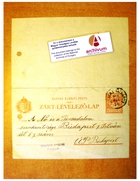
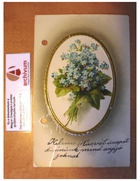
![Megbizó Levél, Mrs. Gábor Magyar and Mrs. István Bordás, Balmazújváros, 12 November [ca. 1910s] Megbizó Levél, Mrs. Gábor Magyar and Mrs. István Bordás, Balmazújváros, 12 November [ca. 1910s]](https://d3crmev290s45i.cloudfront.net/content/1009464xxx/1009464596/1009464596-size-exact-140x0.jpg)
